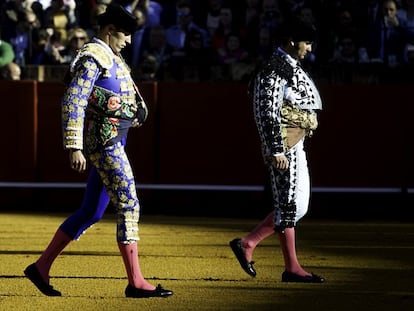The thick-blooded Spaniards
Dogmatism is a feature of any debate in Spanish society, which tends to ideologize everything from politics to bullfighting. The recent repeat elections are a prime example

One of the characters in the 1986 movie Half of Heaven notes at one point that genuine Spaniards have thick blood running through their veins.
While this singularity is hard to pinpoint, the assertion underscores Spaniards¡¯ characteristic obstinacy, extreme partisanship and at times, outright sectarianism. From this perspective, every debate is reduced to personal interests and individual perspectives, constrained by a conceptual short-sightedness that excludes other people¡¯s criteria.
A recent and colorful example is the trial against Bar?a player Leo Messi. The public debate should be restricted to tax-related and legal matters, yet this kind of rigor is completely lost in the belligerence of the overlying cause: Catalan nationalism. Catalan sports media are defending the player from blasphemy, as though the Argentinean were a totem, while his club fuels speculation about institutional harassment from Madrid, where anti-separatist sentiment prevails.
In TV debates, the scene almost always ends dramatically with two fronts expressing themselves with great vehemence and predictable exaggeration
In other words, the issue becomes black and white, as is often the case with other court-related episodes. The No¨®s trial involving Cristina de Borb¨®n is a battleground pitting royalists against republicans, and other issues such as bullfighting, the environment or the solutions to Islamist terrorism are equally tinged with ideology and brotherly hatred.
It¡¯s all about taking a stand and turning it into dogma, as recently demonstrated by the failed negotiations that followed the general election of December 20.
The old-fashioned logic of bloc versus bloc was caught unawares by a new era that required parties to reinforce supporter loyalty, exacerbate differences and work together. And this is where sectarian thought finds its most favorable environment.
Sign up for our newsletter
EL PA?S English Edition has launched a weekly newsletter. Sign up today to receive a selection of our best stories in your inbox every Saturday morning. For full details about how to subscribe, click here.
Rather than encourage a culture of dialogue, confrontation and tension have been stimulated instead. It is plain to see in the belligerence of Spanish patriotism versus regional nationalism ¨C the dispute over the esteladas (unofficial Catalan flags used by separatists) at the Copa del Rey final was a telling example.
This feature of the Spanish character can be seen in the vindictive mentality of populism. Podemos has gone so far as to split into followers of leader Pablo Iglesias ¨C the pablistas ¨C and supporters of number-two official I?igo Errej¨®n ¨C the errejonistas ¨C in their own internal battle over whether to negotiate with the Socialists or not.
On December 21, 2015 Spain awoke to an Italian-type parliament, albeit one steeped in Spanish sectarian mentality. Nobody was prepared to be flexible. Personal interests came ahead of the collective emergency requiring a new government, proving true the old statement by Italian politician Giulio Andreotti, who said that Spanish politics lacked finezza (refinement). As a matter of fact, the stalemate took us right back to Goya¡¯s 1820s painting Fight with Cudgels, an allegory of immobility in which two thick-blooded Spaniards beat at each other while mired knee-deep in mud.
Cool heads rarely predominate in debates here, and Spanish sectarianism often reflects its dictionary definition by the Royal Academy: ¡°Fanaticism and intransigence in the defense of an idea or ideology.¡±

The sociologist Jos¨¦ Juan Toharia attributes the problem to a lack of tolerance and the absence of a real emotional education in Spain.
¡°Both traits are derived from the culture under Franco, making Spaniards particularly disinclined to go back on their own statements. What prevails is a staunch defense of one¡¯s own positions, even if recent surveys show different attitudes, as though we said one thing and then did something else.¡±
A Metroscopia survey showed tremendous sensitivity to other people¡¯s opinions, with 89% of respondents believing that a nation¡¯s prosperity requires respect for other ideas and lifestyles, and 98% stating that anyone can say whatever they want, as long as everyone¡¯s opinions are respected.
But that is certainly not the sense one gets from political debates on television, where the scene almost always ends dramatically with two fronts expressing themselves with great vehemence and predictable exaggeration.
That would explain why audiences identify with one or other of the entrenched positions, as though these televised debates were an extension of their own bipolar conversations at the local bar. It reminds one of Antonio Machado¡¯s verse: ¡°Espa?olito que vienes al mundo, te guarde Dios, una de las dos Espa?as ha de helarte el coraz¨®n¡±. (Little Spaniard who is coming into this world, may God keep you safe, for one of the two Spains will freeze your heart.¡±)
English version by Susana Urra.
Tu suscripci¨®n se est¨¢ usando en otro dispositivo
?Quieres a?adir otro usuario a tu suscripci¨®n?
Si contin¨²as leyendo en este dispositivo, no se podr¨¢ leer en el otro.
FlechaTu suscripci¨®n se est¨¢ usando en otro dispositivo y solo puedes acceder a EL PA?S desde un dispositivo a la vez.
Si quieres compartir tu cuenta, cambia tu suscripci¨®n a la modalidad Premium, as¨ª podr¨¢s a?adir otro usuario. Cada uno acceder¨¢ con su propia cuenta de email, lo que os permitir¨¢ personalizar vuestra experiencia en EL PA?S.
En el caso de no saber qui¨¦n est¨¢ usando tu cuenta, te recomendamos cambiar tu contrase?a aqu¨ª.
Si decides continuar compartiendo tu cuenta, este mensaje se mostrar¨¢ en tu dispositivo y en el de la otra persona que est¨¢ usando tu cuenta de forma indefinida, afectando a tu experiencia de lectura. Puedes consultar aqu¨ª los t¨¦rminos y condiciones de la suscripci¨®n digital.










































